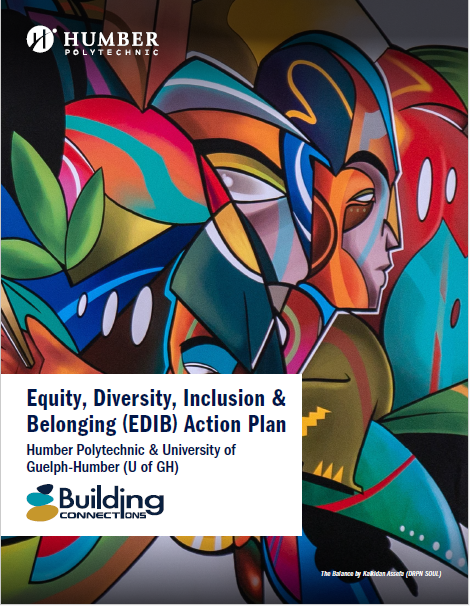Office of Equity, Diversity, Inclusion & Belonging (EDIB)
The EDIB Office aims to consistently foster a learning/working and living environment where every student can thrive. To do this, the office actively engages with Humber College and the wider community in transformative learning to further develop sustainable inclusive working, learning and living environments based on EDIB principles and to empower students/employees to consistently advocate for the human rights, dignity and success for all. Our mandate also reflects the college community collectively working together towards strengthening equitable access of opportunity that impact graduate employment outcomes by ensuring all students are actively leveraging what is unique to Humber.
Action Plan

BUILDING CONNECTIONS outlines our plan to further create an EDIB-focused institution. This Action Plan acknowledges where we have been, where we are now and where we are going. The actions contained within are not exhaustive. BUILDING CONNECTIONS will strengthen the community’s understanding of EDIB and act as a guide to reimagining institutional approaches and integrating EDIB principles into our work.
Our Mandate:
The Office of EDIB develops sustainable organizational inclusion to actively engage with Humber/UGH and the wider community in transformative learning that will consistently foster a learning, working, and living environment where every student/employee can thrive.
This mandate reflects the community collectively working together towards strengthening equitable access of opportunity that impact graduate employment outcomes by ensuring all students are actively leveraging what is unique to Humber/UGH.
How We Achieve Our Mandate
![]() Deepen the community's understanding on how to advance EDIB within their respective area.
Deepen the community's understanding on how to advance EDIB within their respective area.
![]() Support the community in building systems and processes that embed organizational-wide EDIB commitments and convert them to tangible actions and outcomes.
Support the community in building systems and processes that embed organizational-wide EDIB commitments and convert them to tangible actions and outcomes.
![]() Strengthen leadership capacity to consistently model approaches, actions, and behaviors that advance EDIB and promote individual commitments and institutional EDIB interventions.
Strengthen leadership capacity to consistently model approaches, actions, and behaviors that advance EDIB and promote individual commitments and institutional EDIB interventions.
![]() Track and measure institutional progress in order to make informed decisions on how to best advance EDIB, including developing dashboards and new data sources.
Track and measure institutional progress in order to make informed decisions on how to best advance EDIB, including developing dashboards and new data sources.


